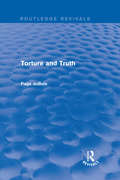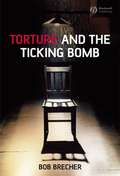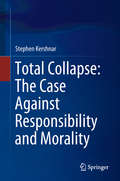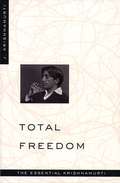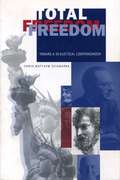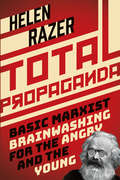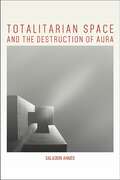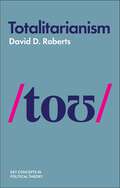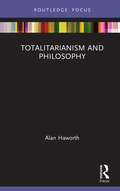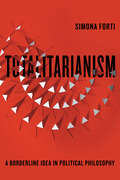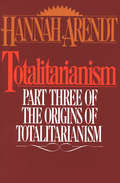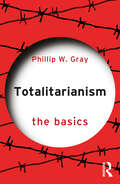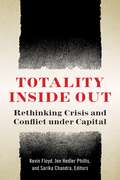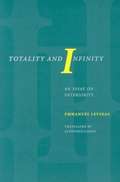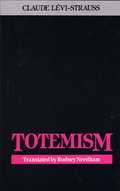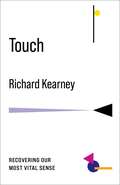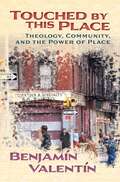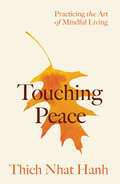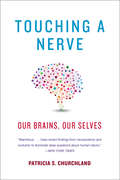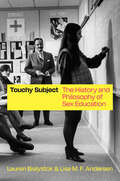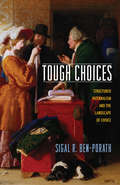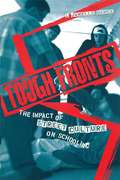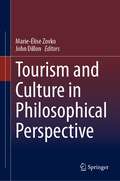- Table View
- List View
Torture and Truth (New Ancient World Ser.)
by Page duBoisFirst published in 1991, this book — through the examination of ancient Greek literary, philosophical and legal texts — analyses how the Athenian torture of slaves emerged from and reinforced the concept of truth as something hidden in the human body. It discusses the tradition of understanding truth as something that is generally concealed and the ideas of ‘secret space’ in both the female body and the Greek temple. This philosophy and practice is related to Greek views of the ‘Other’ (women and outsiders) and considers the role of torture in distinguishing slave and free in ancient Athens. A wide range of perspectives — from Plato to Sartre — are employed to examine the subject.
Torture and the Ticking Bomb (Blackwell Public Philosophy Series)
by Bob BrecherThis timely and passionate book is the first to address itself to Harvard Law Professor Alan Dershowitz’s controversial arguments for the limited use of interrogational torture and its legalisation. Argues that the respectability Dershowitz's arguments confer on the view that torture is a legitimate weapon in the war on terror needs urgently to be countered Takes on the advocates of torture on their own utilitarian grounds Timely and passionately written, in an accessible, jargon-free style Forms part of the provocative and timely Blackwell Public Philosophy series
Torture in the National Security Imagination
by Stephanie AtheyReassessing the role of torture in the context of police violence, mass incarceration, and racial capitalism At the midpoint of a century of imperial expansion, marked on one end by the Philippine–American War of 1899–1902 and on the other by post–9/11 debates over waterboarding, the United States embraced a vision of &“national security torture,&” one contrived to cut ties with domestic torture and mass racial terror and to promote torture instead as a minimalist interrogation tool. Torture in the National Security Imagination argues that dispelling this vision requires a new set of questions about the everyday work that torture does for U.S. society. Stephanie Athey describes the role of torture in the proliferation of a U.S. national security stance and imagination: as U.S. domestic tortures were refined in the Philippines at the turn of the twentieth century, then in mid-century counterinsurgency theory and the networks that brought it home in the form of law-and-order policing and mass incarceration. Drawing on examples from news to military reports, legal writing, and activist media, Athey shows that torture must be seen as a colonial legacy with a corporate future, highlighting the centrality of torture to the American empire—including its role in colonial settlement, American Indian boarding schools, and police violence. She brings to the fore the spectators and commentators, the communal energy of violence, and the teams and target groups necessary to a mass undertaking (equipment suppliers, contractors, bureaucrats, university researchers, and profiteers) to demonstrate that, at base, torture is propelled by local social functions, conducted by networked professional collaborations, and publicly supported by a durable social imaginary.
Total Collapse: The Case Against Responsibility and Morality
by Stephen KershnarThis book argues that there is no morality and that people are not morally responsible for what they do. In particular, it argues that what people do is neither right nor wrong and that they are neither praiseworthy nor blameworthy for doing it. Morality and moral responsibility lie at the heart of how we view the world. In our daily life, we feel that people act rightly or wrongly, make the world better or worse, and are virtuous or vicious. These policies are central to our justifying how we see the world and treat others. In this book, the author argues that our views on these matters are false. He presents a series of arguments that threaten to undermine our theoretical and practical worldviews. The philosophical costs of denying moral responsibility and morality are enormous. It does violence to philosophical positions that many people took a lifetime to develop. Worse, it does violence to our everyday view of people. A host of concepts that we rely on daily (praiseworthy, blameworthy, desert, virtue, right, wrong, good, bad, etc.) fail to refer to any property in the world and are thus deeply mistaken. This book is of interest to philosophers, lawyers, and humanities professors as well as people interested in morality, law, religion, and public policy.
Total Freedom
by Jiddu KrishnamurtiCounted among his admirers are Jonas Salk, Aldous Huxley, David Hockney, and Van Morrison, along with countless other philosophers, artist, writers and students of the spiritual path. Now the trustees of Krishnamurti's work have gathered his very best and most illuminating writings and talks to present in one volume the truly essential ideas of this great spiritual thinker. Total Freedom includes selections from Krishnamurti's early works, his 'Commentaries on Living', and his discourses on life, the self, meditation, sex and love. These writings reveal Krishnamuri's core teachings in their full eloquence and power: the nature of personal freedom; the mysteries of life and death; and the 'pathless land', the personal search for truth and peace. Warning readers away from blind obedience to creeds or teachers - including himself - Krishnamurti celebrated the individual quest for truth, and thus became on of the most influential guides for independent-minded seekers of the twentieth century - and beyond.
Total Freedom: Toward a Dialectical Libertarianism
by Chris Matthew SciabarraBuilding upon his previous books about Marx, Hayek, and Rand, Total Freedom completes what Lingua Franca has called Sciabarra’s "epic scholarly quest" to reclaim dialectics, usually associated with the Marxian left, as a methodology that can revivify libertarian thought. Part One surveys the history of dialectics from the ancient Greeks through the Austrian school of economics. Part Two investigates in detail the work of Murray Rothbard as a leading modern libertarian, in whose thought Sciabarra finds both dialectical and nondialectical elements. Ultimately, Sciabarra aims for a dialectical-libertarian synthesis, highlighting the need (not sufficiently recognized in liberalism) to think of the "totality" of interconnections in a dynamic system as the way to ensure human freedom while avoiding "totalitarianism" (such as resulted from Marxism).
Total Propaganda: Basic Marxist Brainwashing for the Angry and the Young
by Helen RazerA cheeky introduction to Marxism and socialism for everyone fed up with their capitalist woes. Millennials have it bad. They face the problems of underemployment, unaffordable housing, and economists who write crap columns telling them it’s their fault for taking an Uber to brunch. Today the future’s so dark we need night vision goggles, not a few liberal guys shining a torch on a sandwich. Maybe today we could use the light of Karl Marx. Marx may not have had much to say about brunch in the twenty-first century, but he sure had some powerful thoughts about where the system of capitalism would land us. Over time, it would produce a series of crises, he said, before pushing the wealth so decisively up that the top-heavy system would come crashing down with a push. Pushy old communist Helen Razer offers an introduction to the thought of Marx for Millennials and anyone else tired of wage stagnation, growing global poverty, and economists writing desperate columns saying everything would work better if only we stopped eating avocado toast.
Totalitarian Space and the Destruction of Aura
by Saladdin AhmedWe live today within a system in which state and corporate power aim to render space flat, transparent, and uniform, for only then can it be truly controlled. The gaze of power and the commodity form are capable of infiltrating even the darkest of corners, and often, we invite them into our most private spaces. We do so as a matter of convenience, but also to placate ourselves and cope with the alienation inherent in our everyday lives. The resulting dominant space can best be termed totalitarian. It is space stripped of uniqueness, deprived of the "spatial aura" necessary for authentic experience. In Totalitarian Space and the Destruction of Aura, Saladdin Ahmed sets out to help us grasp what has been lost before no trace remains. He draws attention to that which we might prefer not to see, but despite the bleakness of this indictment of reality, the book also offers a message of hope. Namely, it is only once we comprehend the magnitude of the threat to our spatial experience and our own complicity in sustaining this system that we can begin to resist the totalizing forces at work.
Totalitarianism (Key Concepts in Political Theory)
by David D. RobertsLess than a century old, the concept of totalitarianism is one of the most controversial in political theory, with some proposing to abandon it altogether. In this accessible, wide-ranging introduction, David Roberts addresses the grounds for skepticism and shows that appropriately recast—as an aspiration and direction, rather than a system of domination—totalitarianism is essential for understanding the modern political universe. Surveying the career of the concept from the 1920s to today, Roberts shows how it might better be applied to the three ""classic"" regimes of Fascist Italy, Nazi Germany, and the Stalinist Soviet Union. Extending totalitarianism’s reach into the twenty-first century, he then examines how Communist China, Vladimir Putin's Russia, the Islamic Republic of Iran, the self-proclaimed Islamic State (IS), and the threat of the technological “surveillance state” can be conceptualized in the totalitarian tradition. Roberts shows that although the term has come to have overwhelmingly negative connotations, some have enthusiastically pursued a totalitarian direction—and not simply for power, control, or domination. This volume will be essential reading for any student, scholar or reader interested in how totalitarianism does, and could, shape our modern political world.
Totalitarianism and Philosophy (Routledge Focus on Philosophy)
by Alan HaworthWhen Mussolini, Hitler and Stalin first came to power in the 1930s, their regimes were considered by many to represent a new and perplexing phenomenon. They were labelled ‘totalitarian’. But is ‘totalitarianism’ genuinely new, or is the word just another name for something old and familiar, namely tyranny? This is the first question to be addressed by Alan Haworth in this book, which explores the relevance of philosophy to the understanding of totalitarianism. In the course of the discussion, definitions are tested. Is it coherent to think of totalitarianism as the imposition of a ‘total state’, or of ‘total control’? Could it even be that the idea of totalitarianism is a ‘non-concept’? Examining the work of the totalitarian philosophers Giovanni Gentile and Carl Schmitt, the idea of ‘totalitarianism by other means’ as represented in dystopian fiction, and the philosophy of Hannah Arendt, Totalitarianism and Philosophy is essential reading for all students and scholars of political philosophy.
Totalitarianism: A Borderline Idea in Political Philosophy (Square One: First-Order Questions in the Humanities)
by Simona FortiIn the last decade, we have witnessed the return of one of the most controversial terms in the political lexicon: totalitarianism. What are we talking about when we define a totalitarian political and social situation? When did we start using the word as both adjective and noun? And, what totalitarian ghosts haunt the present? Philosopher Simona Forti seeks to answer these questions by reconstructing not only the genealogy of the concept, but also by clarifying its motives, misunderstandings, and the controversies that have animated its current resurgence. Taking into account political theories and historical discussions, Totalitarianism especially focuses on philosophical reflections, from the question of totalitarian biopolitics to the alleged totalitarian drifts of neoliberalism. The work invites the relentless formulation of a radical question about the democratic age: the possibilities it has opened up, the voids it leaves behind, the mechanisms it activates, and the "voluntary servitude" it produces. Forti argues that totalitarianism cannot be considered an external threat to democracy, but rather as one of the possible answers to those questions posed by modernity which democracies have not been able to solve. Her investigation of the uses and abuses of totalitarianism as one of the fundamental categories of the twentieth and twenty-first centuries promises to provoke much-needed discussion and debate among those in philosophy, politics, ethics, and beyond.
Totalitarianism: Part Three of The Origins of Totalitarianism (Origins Of Totalitarianism Ser.)
by Hannah ArendtThe great twentieth-century political philosopher examines how Hitler and Stalin gained and maintained power, and the nature of totalitarian states. In the final volume of her classic work The Origins of Totalitarianism, Hannah Arendt focuses on the two genuine forms of the totalitarian state in modern history: the dictatorships of Bolshevism after 1930 and of National Socialism after 1938. Identifying terror as the very essence of this form of government, she discusses the transformation of classes into masses and the use of propaganda in dealing with the nontotalitarian world—and in her brilliant concluding chapter, she analyzes the nature of isolation and loneliness as preconditions for total domination. &“The most original and profound—therefore the most valuable—political theoretician of our times.&” —Dwight Macdonald, The New Leader
Totalitarianism: The Basics (The Basics)
by Phillip W. GrayTotalitarianism: The Basics is an easy-to-read introduction into the main concepts, ideologies, and regimes associated with totalitarianism. Starting with an overview of how scholars have attempted to define totalitarianism, Phillip W. Gray begins with an examination of the various types of terms used, helping the reader think about how these terms do – and do not – apply to different ideologies and governments. Easily accessible language and the use of numerous examples aid readers in seeing the connections between certain types of ideologies and some forms of organization/movements in their relation to historically well-known totalitarian regimes. Gray concludes with the tools necessary to think through how to distinguish between an actual (or potential) totalitarian system and regimes that, while oppressive or authoritarian, would not be totalitarian in nature. A rich bibliography containing additional readings bookend the text. Totalitarianism: The Basics offers an essential introduction for students from all backgrounds seeking to understand totalitarianism and for general readers with an interest in political ideologies and extremism. For those knowledgeable in this field, it adds conceptual relevance and a variety of ways of thinking about the term.
Totality Inside Out: Rethinking Crisis and Conflict under Capital
by Kevin Floyd, Jen Hedler Phillis, and Sarika ChandraHowever divergent their analyses may be in other ways, some prominent anti-capitalist critics have remained critical of contemporary debates over reparative justice for groups historically oppressed and marginalized on the basis of race, gender, sexual identity, sexual preference, and/or ability, arguing that the most these struggles can hope to produce is a more diversity-friendly capital. Meanwhile, scholars of gender and sexuality as well as race and ethnic studies maintain that, by elevating the socioeconomic above other logics of domination, anti-capitalist thought fails to acknowledge specific forms and experiences of subjugation.The thinkers and activists who appear in Totality Inside Out reject this divisive logic altogether. Instead, they aim for a more expansive analysis of our contemporary moment to uncover connected sites of political struggle over racial and economic justice, materialist feminist and queer critique, climate change, and aesthetic value. The re-imagined account of capitalist totality that appears in this volume illuminates the material interlinkages between discrepant social phenomena, forms of oppression, and group histories, offering multiple entry points for readers who are interested in exploring how capitalism shapes integral relations within the social whole.Contributors: Brent Ryan Bellamy, Sarah Brouillette, Sarika Chandra, Chris Chen,Joshua Clover, Tim Kreiner, Arthur Scarritt, Zoe Sutherland, Marina Vishmidt
Totality and Infinity: An Essay on Exteriority
by Alphonso Lingis Emmanuel LevinasFirst published in English by Duquesne in 1969, this has become one of the classics of modern philosophy.
Totemism
by Claude Levi-Strauss"Levi-Strauss continues his assault on the myth of the primitice as savage by turning to the phenomena of totemism an totoemix classification ... to show, contrary to this myth, that primitive thought rests upon a rich and complex conceptual structure." - Commentary
Touch: Recovering Our Most Vital Sense (No Limits)
by Richard KearneyOur existence is increasingly lived at a distance. As we move from flesh to image, we are in danger of losing touch with each other and ourselves. How can we combine the physical with the virtual, our embodied experience with our global connectivity? How can we come back to our senses?Richard Kearney offers a timely call for the cultivation of the basic human need to touch and be touched. He argues that touch is our most primordial sense, foundational to our individual and common selves. Kearney explores the role of touch, from ancient wisdom traditions to modern therapies. He demonstrates that a fundamental aspect of touch is interdependence, its inherently reciprocal nature, which offers a crucial corrective to our fixation with control. Making the case for the complementarity of touch and technology, this book is a passionate plea to recover a tangible sense of community and the joys of life with others.
Touched By This Place: Theology, Community, and the Power of Place
by Benjamín ValentínTouched by this Place casts attention to the multidimensional significance of place in our lives, focusing the reader’s attention on how place contributes to how we think theologically about God, the world, and our lives as interrelated creatures. Paying attention to Spanish Harlem, where he grew up and lived for twenty-seven years, Valentín encourages readers to recognize how our thinking, theological and otherwise, influences the particular geographical places in which we live, move, and happen in the world. Place influences and is influenced by human thought, experience, memory, identity, and activity, and it is time for Christian theology to return to place and place-based thinking.
Touching Peace: Updated Edition
by Thich Nhat HanhThe world-renowned Zen Buddhist teacher and author of No Mud, No Lotus presents mindfulness and meditation as tools for examining—and solving—both personal and global challenges. In Touching Peace, Thich Nhat Hanh expands the teachings on practicing the art of mindful living begun in the best-selling Being Peace by giving specific, practical instructions on extending our meditation practice into our daily lives. Thich Nhat Hanh reminds us to focus on what is refreshing and healing within and all around us—and how, paired with the practice of mindful breathing, it can be used as the basis for examining the roots of war and violence, alcoholism and drug abuse, and social alienation. Included are classic Thich Nhat Hanh practices and teachings such as the conflict resolution tool of the Peace Treaty; his thoughts on a &“diet for a mindful society&” based on his interpretation of the 5 Mindfulness Trainings; and his early writings on the environment. With Touching Peace, Nhat Hanh shares his vision for rebuilding society through strengthening our families and communities, and realizing the ultimate dimension of reality in each act of our daily lives.
Touching a Nerve: Our Brains, Our Selves
by Patricia S. ChurchlandA trailblazing philosopher's exploration of the latest brain science--and its ethical and practical implications. What happens when we accept that everything we feel and think stems not from an immaterial spirit but from electrical and chemical activity in our brains? In this thought-provoking narrative--drawn from professional expertise as well as personal life experiences--trailblazing neurophilosopher Patricia S. Churchland grounds the philosophy of mind in the essential ingredients of biology. She reflects with humor on how she came to harmonize science and philosophy, the mind and the brain, abstract ideals and daily life. Offering lucid explanations of the neural workings that underlie identity, she reveals how the latest research into consciousness, memory, and free will can help us reexamine enduring philosophical, ethical, and spiritual questions: What shapes our personalities? How do we account for near-death experiences? How do we make decisions? And why do we feel empathy for others? Recent scientific discoveries also provide insights into a fascinating range of real-world dilemmas--for example, whether an adolescent can be held responsible for his actions and whether a patient in a coma can be considered a self. Churchland appreciates that the brain-based understanding of the mind can unnerve even our greatest thinkers. At a conference she attended, a prominent philosopher cried out, "I hate the brain; I hate the brain!" But as Churchland shows, he need not feel this way. Accepting that our brains are the basis of who we are liberates us from the shackles of superstition. It allows us to take ourselves seriously as a product of evolved mechanisms, past experiences, and social influences. And it gives us hope that we can fix some grievous conditions, and when we cannot, we can at least understand them with compassion.
Touchy Subject: The History and Philosophy of Sex Education (History And Philosophy Of Education Ser.)
by Lauren Bialystok Lisa M.F. AndersenA case for sex education that puts it in historical and philosophical context. In the United States, sex education is more than just an uncomfortable rite of passage: it's a political hobby horse that is increasingly out of touch with young people’s needs. In Touchy Subject, philosopher Lauren Bialystok and historian Lisa M. F. Andersen unpack debates over sex education, explaining why it’s worth fighting for, what points of consensus we can build upon, and what sort of sex education schools should pursue in the future. Andersen surveys the history of school-based sex education in the United States, describing the key question driving reform in each era. In turn, Bialystok analyzes the controversies over sex education to make sense of the arguments and offer advice about how to make educational choices today. Together, Bialystok and Andersen argue for a novel framework, Democratic Humanistic Sexuality Education, which exceeds the current conception of “comprehensive sex education” while making room for contextual variation. More than giving an honest run-down of the birds and the bees, sex education should respond to the features of young people’s evolving worlds, especially the digital world, and the inequities that put some students at much higher risk of sexual harm than others. Throughout the book, the authors show how sex education has progressed and how the very concept of “progress” remains contestable.
Tough Choices: Structured Paternalism and the Landscape of Choice
by Sigal R. Ben-PorathTo what extent should government be permitted to intervene in personal choices? In grappling with this question, liberal theory seeks to balance individual liberty with the advancement of collective goals such as equality. Too often, however, society's obligation to provide meaningful opportunities is overshadowed by its commitment to personal freedom. Tough Choices charts a middle course between freedom-oriented anti-interventionism and equality-oriented social welfare, presenting a way to structure choices that equalize opportunities while protecting the freedom of individuals to choose among them. Drawing on insights from behavioral economics, psychology, and educational theory, Sigal Ben-Porath makes the case for structured paternalism, which is based on the understanding that state intervention is often inevitable, and that therefore theorists and policymakers must focus on the extent to which it can productively be applied, as well as on the forms it should take in different social domains. Ben-Porath explores how structured paternalism can play a role in providing equal opportunities for individual choice in an array of personal and social contexts, including the intimate lives of adults, parent-child relationships, school choice, and intercultural relations. Tough Choices demonstrates how structured paternalism can inform more egalitarian social policies, ones that acknowledge personal, social, and cultural differences as well as the challenges all individuals may face when they make a choice.
Tough Fronts: The Impact of Street Culture on Schooling (Critical Social Thought Ser.)
by L Janelle DanceTough Fronts takes the difficult issues in urban education head on by putting street-savvy students at the forefront of the discussion on how to best make successful changes for inner city schools. Individual chapters discuss scholarly depictions of black America, the social complexity of the teacher-student relationship, individual success stories of 'at-risk' programs, popular images of urban students, and implications for education policy. With close attention to the voices of individual students, this engaging book gives vitality and legitimacy to arguments for school changes that have been lacking in previous discussions.
Tourism and Culture in Philosophical Perspective
by John Dillon Marie-Élise ZovkoThis book offers a philosophical approach to tourism as a permanent factor in the lifestyle, economy, and culture of the contemporary global community. Travel to well-known destinations and pursuit of an ever-increasing range of leisure activities are an aspiration of most humans today. Those not themselves engaged in tourist activities are quite often involved in providing the goods and services which make tourism possible. Yet the ill effects of mass tourism and overtourism on sensitive ecosystems, resources, and community life have begun to outweigh economic gains, threatening to destroy destinations, cultural heritage, and livelihoods. The editors and contributors of this collection reflect on the nature and meaning of tourism, its history, elements, and forms, the roles of tourist and host, the limits of hospitality, tendencies to excess and the reasons why we engage in such forms of behaviour, and the place of tourism in human culture as a whole. By shedding light on these questions, more efficacious solutions to the urgent problems raised by the practice of tourism can be found. This work is a must-read for scholars, teachers, and students engaged in study and research on philosophy of culture, philosophical anthropology, tourist and destination management, human factors engineering, and sustainability.
